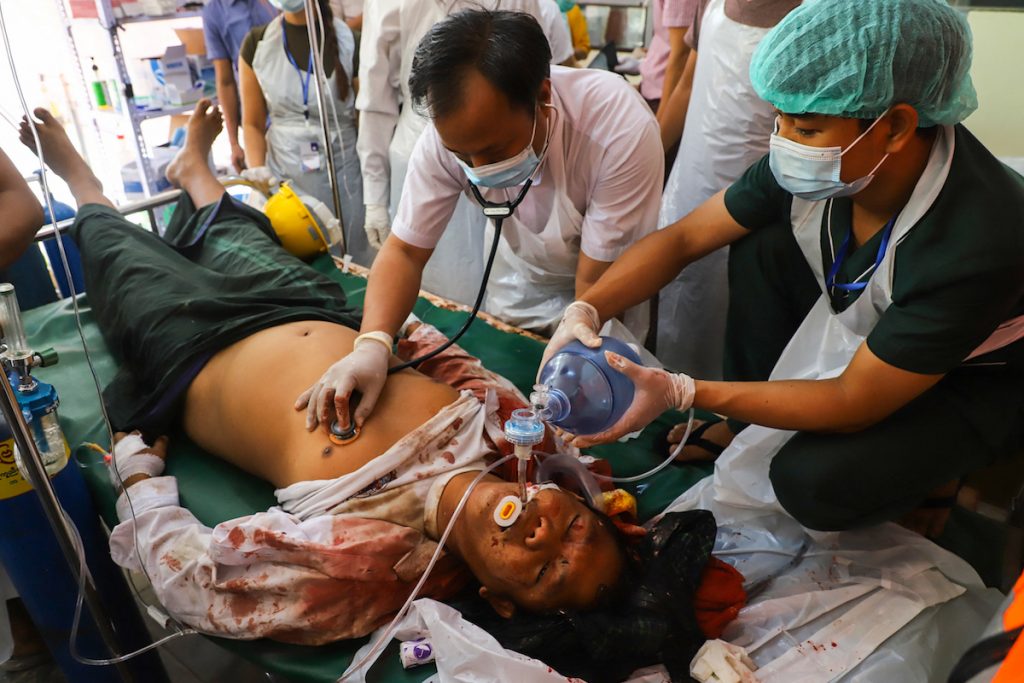At least 18 people were killed in an escalation of violence carried out by state security forces against anti-coup protestors in Myanmar on Feb. 28, the United Nations has said.
UN Human Rights Office Spokesperson Ravina Shamdasani said that a further 30 people were wounded, according to information deemed credible by the UN office.
“We strongly condemn the escalating violence against protests in Myanmar and call on the military to immediately halt the use of force against peaceful protestors,” Shamdasani said.
“Throughout the day, in several locations throughout the country, police and military forces have confronted peaceful demonstrations, using lethal force and less-than-lethal force,” she said.
“Deaths reportedly occurred as a result of live ammunition fired into crowds in Yangon, Dawei, Mandalay, Myeik, Bago and Pokokku,” she said. “Tear gas was also reportedly used in various locations as well as flash-bang and stun grenades.”
Shamdasani said that police have detained at least 85 medical professionals and students, as well as seven journalists, who were present at the demonstrations.
Media reports said that across the country, protesters wearing plastic work helmets and with makeshift shields faced off against police and soldiers in battle gear, including some from units notorious for tough crackdowns on ethnic rebel groups in Myanmar’s border regions.

Crowds of demonstrators came under fire in various parts of the biggest city of Yangon after stun grenades, tear gas and shots in the air failed to break up their protests.
Several wounded people were hauled away in Yangon by fellow protesters, leaving bloody smears on pavements, media images showed. One man died after arriving at a hospital with a bullet in his chest, said a doctor who asked not to be identified.
Teacher Tin New Yee died after police swooped to disperse a teachers’ protest with stun grenades, sending the crowd fleeing, her daughter and a fellow teacher said.
Outside a Yangon medical school, doctors and students in white lab coats scattered after police hurled stun grenades. A group called the Whitecoat Alliance of medics said more than 50 medical staff had been arrested.
Three people were killed at Dawei in the south, politician Kyaw Min Htike told Reuters from the town. Two died in the second city of Mandalay, Myanmar Now media and a resident said. Resident Sai Tun told Reuters one woman was shot in the head.
During his homily for the Second Sunday of Lent, Cardinal Charles Maung Bo of Yangon offered Mass for peace in the country. “I have repeated many times: Hatred never drives away hatred: Only love. Darkness never expels darkness; only light can dispel darkness,” Cardinal Bo said.
Among tweets the cardinal sent out on that day featured a nun begging police not to shoot upon protestors in the Kachin State city of Myitkyina.
Defiance of the coup has emerged not just on the streets but more broadly in the civil service, municipal administration, the judiciary, the education and health sectors and the media.
Activists across Asia held protests in support, with the rallying cry “Milk Tea Alliance” which first united pro-democracy activists in Thailand and Hong Kong.
Youth activist Esther Ze Naw said people were battling the fear they had lived with under military rule.
The UN said that more than 1,000 people have been arbitrarily arrested and detained since the coup was carried out on Feb. 1. Some of these people remain unaccounted for. The UN said that these arrests were mostly done without any form of due process.
Protests began after the army seized power and detained elected government leader Aung San Suu Kyi and much of her party leadership on Feb. 1, alleging fraud in a November election her party won in a landslide.
Suu Kyi, 75, and her supporters, have said the result of the November vote must be respected.
Suu Kyi, who spent nearly 15 years under house arrest, faces charges of illegally importing six walkie-talkie radios and of violating a natural disaster law by breaching coronavirus protocols. The next hearing in her case is on March 1.
The junta have promised to hold a new election but have not set a date.
Watch video of some of the protests in Yangon on Feb. 28 here below.
With Reuters






